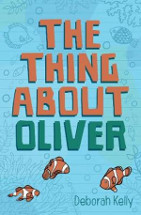The thing about Oliver by Deborah Kelly

Wombat Books, 2019. ISBN: 9781925563818.
(Ages 10-16) Highly recommended. Themes: Autism, Disability,
Siblings, Family. This book is dedicated to the 'glass children'.
These are the children whose lives are almost invisible because they
have a sibling with special needs. In The thing about Oliver,
Deborah Kelly has revealed a heart-wrenching story about the
difficulties for Tilly as she lives as the 'ignored' capable child
because her single-mother's attention must so often be directed to
her autistic and non-verbal younger brother, Oliver. From the first
page, the struggles are evident. When Tilly's mother decides to
relocate to Townsville in order to be near her sister, Tilly suffers
the normal change and separation dilemmas. However, Oliver's
inability to deal with change of any sort, and his loud reactive
tantrums escalate in the new environment. The distress for everyone
is palpable in the story, but the distress that Tilly feels goes to
another level when Oliver destroys her Aqua journal - the precious
and personal recording of all the aquatic things she loves. Her
response to this dilemma leads to even more drama, when Oliver goes
missing. Her inability to swim becomes a metaphor for the way that
circumstances are flooding her life, with no hope of escape. The
story does not end with a 'cure' for all the struggles of Tilly's
life, but there is some light ahead.
The dramatic story-line is incredibly powerful and the complexities
of life with a mute autistic sibling make for an emotional story.
This is a story that leaves the reader heart-broken for the young
Tilly and her mother, but also for the boy Oliver. Because of the
content and the maturity needed to handle the emotional dilemmas,
this book could be read by older readers (older than Primary-aged
Tilly) even though it is relatively simply written. There were many
moments when I was nearly in tears as I felt the pain and distress
of the young girl (and her tired and distraught mother), and I am
sure that an empathic response would be the result from reading this
book.
(Note: Readers who have enjoyed Wonder by R. J. Palacio
could read this book as it also addresses a sibling response to
disability.)
Carolyn Hull